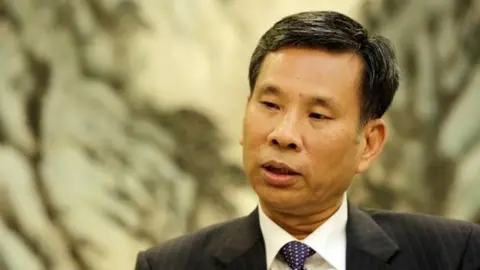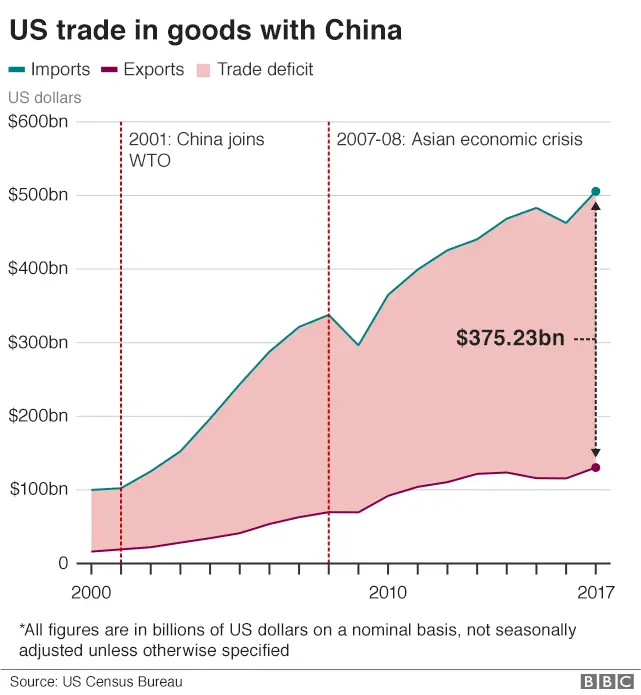US-China trade war: China to respond 'resolutely'
 Reuters
ReutersChina will continue to hit back against the US if more tariffs are imposed, the country's finance minster has said.
In an interview with Reuters, Liu Kun said China would respond "resolutely" to the "unreasonable" US measures.
On Thursday, the US imposed a second wave of tariffs on Chinese goods worth $16bn (£12.4bn), and China immediately responded in kind.
Two days of trade talks in Washington between the two sides failed to make any major progress.
Tariff threats
The escalating trade row between the US and China has now seen each side impose 25% tariffs on a total of $50bn of one another's goods
The US has threatened a third round of tariffs on an additional $200bn of Chinese goods, which could come as soon as next month. President Trump has also said he could slap tariffs on all $500bn of imports from the country.
In his interview with Reuters, Mr Liu said: "China doesn't wish to engage in a trade war, but we will resolutely respond to the unreasonable measures taken by the United States.
"If the United States persists with these measures, we will correspondingly take action to protect our interests."
He said that, so far, the impact of the trade row on the Chinese economy had not been significant, but added that government spending would be increased to support workers affected by the tariffs.
Mr Liu said China was responding to the US measures in a "precise way".
"Of course, the value of US imports of Chinese goods isn't the same as the value of Chinese imports of US goods. We'll take tariff measures in accordance to this situation."
He also said China was trying to ensure that companies operating in the country were not caught up in the crossfire.
"When we take measures, we try our hardest not to harm the interests of foreign businesses in China. That's why our tariff measures are targeted to avoid affecting them as much as we can."

President Trump has long been critical of China, and ordered an investigation into Chinese trade policies in August 2017.
His administration says its goal is to convince China to make its economy more open to foreign companies.
China has loosened some rules in recent months. It removed restrictions on foreign ownership for banks this week, putting into effect a promise from last year.
However, the White House has maintained that China's changes have not gone far enough.
Candid talks
Talks between the US and China concluded this week without a major breakthrough.
White House deputy press secretary Lindsay Walters said the two sides "exchanged views on how to achieve fairness, balance, and reciprocity in the economic relationship".
In a statement, China's Ministry of Commerce said the Chinese delegation had held "constructive and candid" talks on trade issues.
"Both sides will keep in contact about the future arrangement," it added.
 AFP
AFPBy imposing tariffs on Chinese imports, President Trump hopes to make life easier for US companies, whose goods will become cheaper within the US by comparison.
The duties are part of his broader "America First" approach, which has also prompted the US to impose higher import duties on steel and aluminium, including from Mexico, Canada and the European Union. All of those countries have retaliated.
Many US companies and industry groups have testified to the US Trade Representative's Office that their businesses are being harmed.
Firms that rely on Chinese imports face higher costs, while exporters are worried that retaliation will make their products more expensive and reduce demand.
Meantime, China plans to file a fresh complaint against the tariffs at the World Trade Organization (WTO), which adjudicates in global trade disputes.
China's commerce ministry says it "clearly suspected" the US of violating WTO rules.
It filed an initial complaint at the WTO in July as Mr Trump imposed his first round of tariffs.
